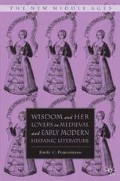Abstract
When Juan Rodríguez del Padrón placed his visionary Siervo libre de amor (Free(d) servant of love) (c. 1440) on Minerva’s path—“la angosta senda, la qual es la vida contemplativa de no amar” (the narrow path that is the contemplative life of not loving)—he knew that he could count on his audience’s recognition of the multiple literary, mythical, and even liturgical intertexts that he brought into play.1 Not only is the laborious ascent made under the aegis of the classical goddess of wisdom, it also leads the love-servant to Syndéresis, the apex or “spark” of the human intellect personified.2 Late-medieval audiences would have recognized both Minerva and Syndéresis as members of a familiar cadre of metonymically related and specifically feminine tropes representative of man’s higher intellectual faculties and the knowledge those faculties may attain and retain.
Access this chapter
Tax calculation will be finalised at checkout
Purchases are for personal use only
Preview
Unable to display preview. Download preview PDF.
Notes
Juan Rodriguez del Padrbn, Siervo libre de amor, ed. Antonio Prieto (Madrid: Castalia, 1986 ), 76.
See Claudia Camp, Wisdom and the Feminine in the Book of Proverbs (Decatur, GA: Almond Press, 1985) and “Woman Wisdom as Root Metaphor: A Theological Consideration,” in The Listening Heart. Essays in Wisdom and the Psalms in Honor of E. Murphy, O. Carm, ed. Kenneth G. Hoglund, Elisabeth F. Huwiler, Jonathan T. Glass, and Roger W. Lee (Sheffield, UK: JSOT, 1987), 45–76; James L. Crenshaw, Old Testament Wisdom: An Introduction (Louisville, KY: Westminster John Knox Press, 1998); Bernhard Lang, Wisdom and the Book of Proverbs: A Hebrew Goddess Redefined (New York: Pilgrim Press, 1986), 142–60; Paul A. Olson, The Journey to Wisdom: Self-education in Patristic and Medieval Literature (Lincoln: University of Nebraska Press, 1995); and Gerhard Von Rad, Wisdom in Israel, trans. James D. Martin ( London: S. C. M. Press, 1972 ).
Boethius, The Consolation of Philosophy, trans. Joel C. Relihan (Indianapolis: Hackett, 2001). The Consolation had a status tantamount to required reading for late-medieval literates. In medieval Iberia, the Consolation and glosses by various authors were circulated in both Latin and in vernacular languages. See Ronald G. Keightley, “Boethius in Spain: A Checklist of Early Translations,” in The Medieval Boethius: Studies in the Vernacular Translations of De Consolatione Philosophiae, ed. A. J. Minnis ( Cambridge, UK: D. S. Brewer, 1987 ), 169–87.
Augustine, Soliloquies and Immortality of the Soul ed. and trans. Gerard Watson (Warminster, UK: Aris & Phillips, 1990), I: 17–25, 47–63.
Barbara Newman, God and the Goddesses: Vision, Poetry, and Belief in the Middle Ages ( Philadelphia: University of Pennsylvania Press, 2003 ), 49.
Copyright information
© 2008 Emily C. Francomano
About this chapter
Cite this chapter
Francomano, E.C. (2008). Introduction. In: Wisdom and Her Lovers in Medieval and Early Modern Hispanic Literature. The New Middle Ages. Palgrave Macmillan, New York. https://doi.org/10.1057/9780230612464_1
Download citation
DOI: https://doi.org/10.1057/9780230612464_1
Publisher Name: Palgrave Macmillan, New York
Print ISBN: 978-1-349-53330-5
Online ISBN: 978-0-230-61246-4
eBook Packages: Palgrave Literature & Performing Arts CollectionLiterature, Cultural and Media Studies (R0)

